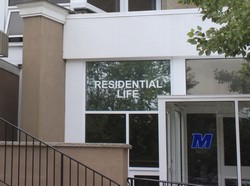Students received an e-mail on July 16 from Residential Life explaining that the staff will be conducting a pilot program for gender-neutral housing in Beechwood Hall this fall semester.
The program marks a major move for the University in acknowledging identities that are included in the Lesbian, Gay, Bisexual, Transgender and other (LGBTQ+) communities in on-campus housing, as well as their needs that must be met while living in residence halls.
In the message, Associate Director of Residential Life and Housing Operations Meg Jones outlines gender-neutral housing and defines it as a residence “in which two or more students mutually agree to share a multiple occupancy suite regardless of students’ sex, gender or gender identity.”
According to Jones, not only does this allow for students that identify as male or female to potentially live together, but also allows for transgender and gender non-conforming students to feel represented in housing arrangements. “It simplifies the process for students finding roommates compatible to themselves and alleviates any assumptions of gender identity,” added Jones.
Corey Wrenn, Ph.D., a lecturer of sociology, agrees that it is imperative for LGBTQ+ youth to have the opportunity to grow and develop amongst their peers.
“Particularly for LGBT youths, a sense of community, family, and belonging is especially important, not just for normalcy and wellbeing, but for adjustment,” said Wrenn. “The switch to college can be a stressful one, but especially for LGBT youths who report much higher levels of anxiety and depression.”
Fellow Associate Director of Housing and Residential Life Mark Holfelder weighed in on the new program, citing that there are clear benefits for students in this program including eliminating discrimination along with the increased choices for roommates. “Gender-neutral housing provides our students and campus community with evidence and support for the University’s non-discrimination policy with respect to gender, sexual orientation, gender identity, and gender expression,” Holfelder said.
Through the efforts of Residential Life and the University, this pilot program will set a precedent for other programs that may be created in the future to address diversity and representation of all students on campus. Jones, along with the Division of Student Life, are looking to educate students beyond their interactions in the classroom.
“Gender-neutral housing helps create a campus climate that is welcoming, inclusive, and supportive of all students,” said Jones. “The addition of gender-neutral housing creates an environment that acknowledges, appreciates and respects the diverse nature of the Monmouth University student body.”
According to Jesse Denniston-Lee, a junior social work student and Beechwood resident, it is just as important for allies as it for their peers to be exposed to other students’ experiences.
“Allowing LGBTQ+ students and their allies to live with each other eliminates any possibility or becoming ostracized from the rest of the student body as a whole,” said Denniston-Lee. “I think that students are just as responsible to uphold the importance of inclusiveness as much as the faculty; advocacy goes a long way in terms of creating social change on a collegiate level.”
Associate Vice President for Student Life James Pillar expressed that gender-neutral housing was not created without obstacles.
“The University community has been supportive of [our] Gender-Neutral Housing pilot program. However, the greatest challenge is creating an environment on campus where all students, regardless of gender or gender identity, feel welcome and able to participate in this program,” said Pillar.
As gender-neutral housing is introduced to residents, it will continue to provide the same amenities that are offered to students in typical housing arrangements while meeting the specific needs of transgender and gender non-conforming students.
Junior chemistry student and Beechwood resident Roxy Nicoletti echoed these sentiments and feels that it is important for transgender and gender non-conforming students to be incorporated into all aspects of campus life. “It allows trans and non-binary students to feel more welcome at Monmouth,” said Nicoletti.
“It’s important to remember that although we’re a small population, trans and non-binary people exist everywhere, even at Monmouth,” continued Nicoletti.
If the University feels that this housing arrangement should continue, Pillar explained that more beds will be added to accommodate more students.
As far as other potential programs that focus on inclusion and diversity, Pillar and Holfelder have both expressed that the University is always working toward implementing new programs.
“The President’s Advisory Council on Diversity assists in any new endeavor or initiative,” said Holfelder. “Currently, the institution is finalizing a preferred name policy and we have trained over 30 members of the MU community to be Safe Zone facilitators.”
With more programs and policies being created for the well-being and success of all students on campus, and Wrenn feels that this decision indicates a positive step forward for the University’s future. “It seems that our institution is slowly catching up to speed with other universities in the country, and there is no reason to believe that much more could be possible.”
PHOTO TAKEN by Nicole Riddle



